| | A disputed three-day truce begins in Ukraine, India and Pakistan exchange barbs but no further shoot͏ ͏ ͏ ͏ ͏ ͏ |
| |  | Flagship |  |
| |
|
The World Today | 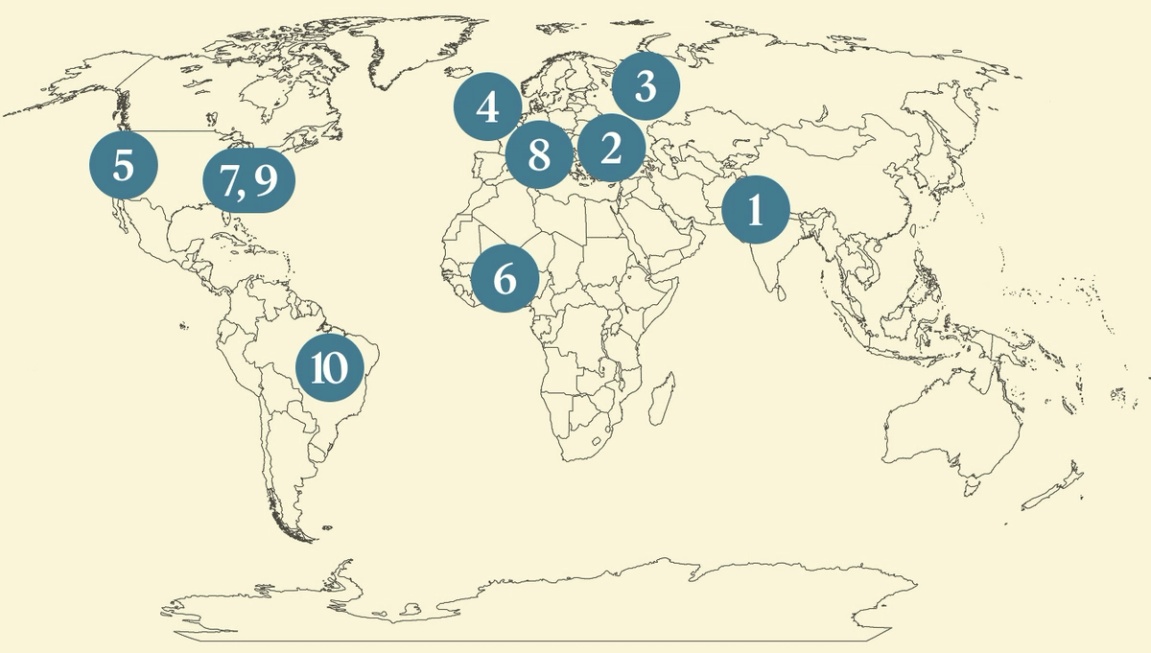 - India-Pakistan attacks
- Disputed Ukraine truce
- Xi in Moscow for parade
- US-UK trade deal near
- US to ease chip curbs
- Impact of US anti-DEI push
- Trump limits virus research
- Black smoke at Vatican
- ‘Soft power’ academic dies
- Recording Brazil’s seeds
 The planetarium turns 100, and recommending a book about the intertwined histories of the US and Latin America. |
|
India, Pakistan exchange attacks |
 Stringer/Reuters Stringer/ReutersIndia and Pakistan exchanged aerial attacks, raising fears of escalation in a conflict spurred by the killing of tourists in Kashmir. Islamabad said it had shot down 25 drones, and New Delhi said it had responded to Pakistani strikes. It follows Indian air and artillery assaults in retaliation for last month’s attack, strikes which Islamabad called an “act of war.” There had been hopes that the two sides would stand down, but one prominent Indian security analyst suggested New Delhi may be trying to deter Islamabad from further aggression with conventional attacks of its own. “It is a time of great peril,” the Pakistani newspaper Dawn argued in an editorial. |
|
Kyiv rejects ‘smoke break’ truce |
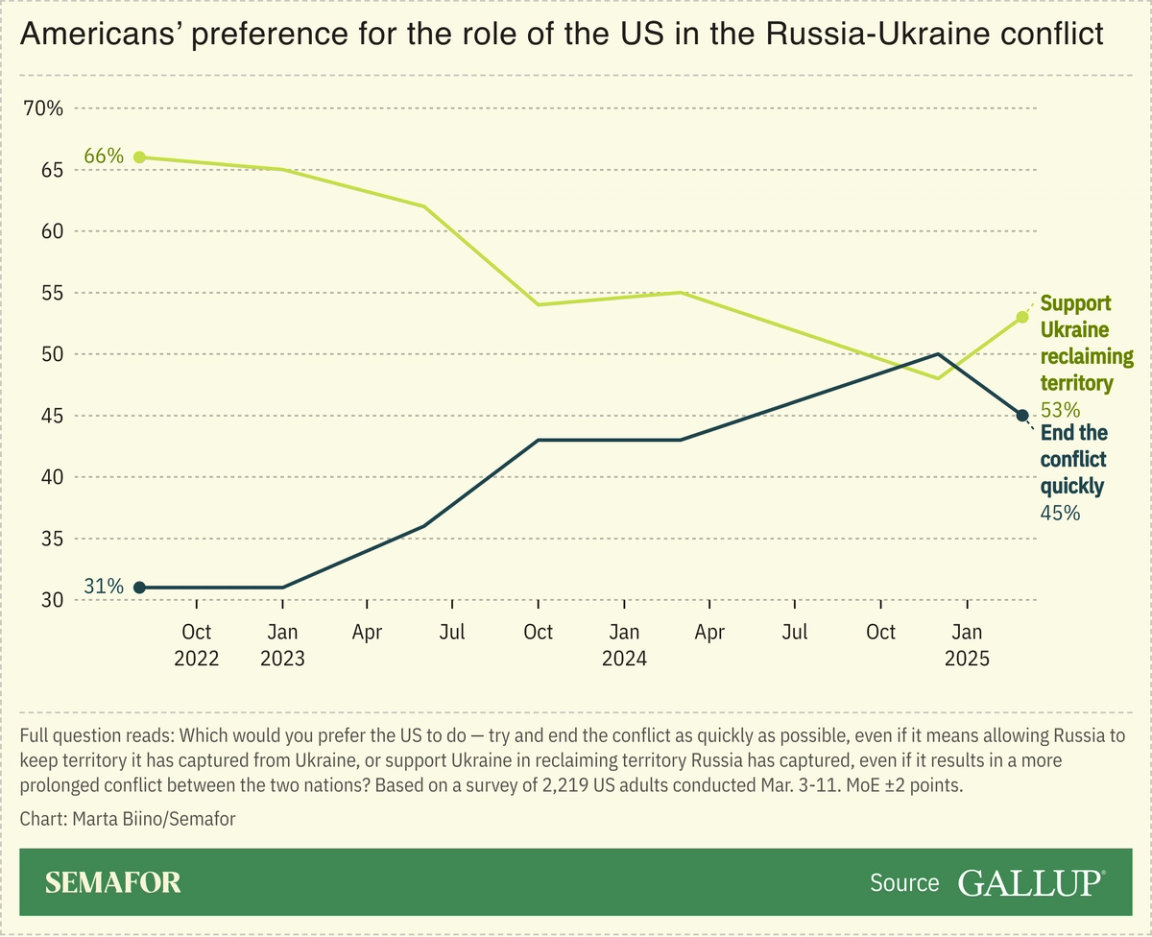 Russia’s unilateral, three-day ceasefire took effect, but Kyiv dismissed the truce and Washington voiced skepticism over Moscow’s seriousness. The partial pause in hostilities coincides with a lavish military parade in the Russian capital to mark the 80th anniversary of the end of World War II. Ukraine said Russia’s offer was designed not to pave the way to peace but to avoid embarrassing security failures during the ceremonies: A Ukrainian military spokesman said the offer was “not a truce, it’s a smoke break.” Russian foot-dragging on a lasting ceasefire is drawing American ire, with the US vice president yesterday arguing that “the Russians [are] asking for too much” in negotiations, a point President Donald Trump echoed. |
|
Xi in Moscow for WW2 parade |
 Evgenia Novozhenina/Pool/Reuters Evgenia Novozhenina/Pool/ReutersA highly publicized display of friendship by China and Russia at Moscow’s Victory Day Parade laid clear their ambitions to capitalize on US political instability. Chinese leader Xi Jinping was the most prominent foreign guest at Russia’s commemorations for the 80th anniversary of the end of World War II, on a trip that will focus on the war in Ukraine and efforts to erode US power: “Beijing and Moscow are poised to be the major beneficiaries of America’s self-inflicted blow to its global stature,” the director of the Carnegie Russia Eurasia Center wrote. Still, their partnership is not invulnerable, a Brookings expert noted, with Moscow exploring a US rapprochement while remaining a “potential liability” for Beijing in the long term. |
|
Trump to unveil UK trade deal |
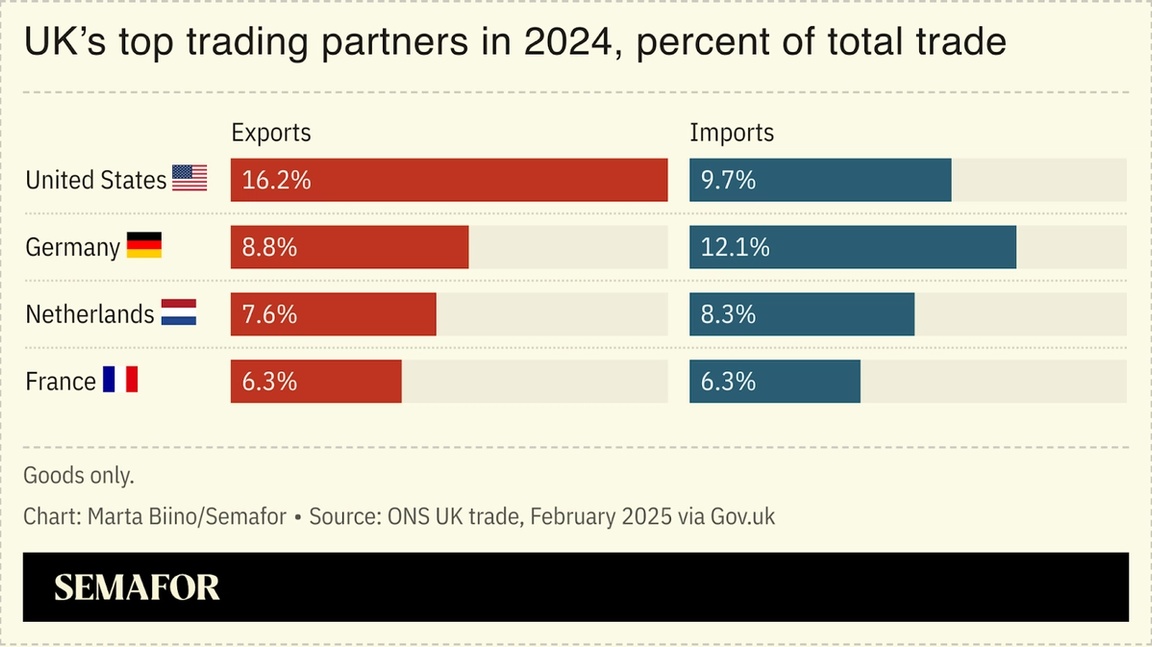 US President Donald Trump is expected to unveil a trade deal with the UK today, a hopeful sign for nations scrambling to avoid punitive tariffs. With two months to go before Washington’s 90-day reprieve on “Liberation Day” duties expires, the White House has said around 70 similar negotiations are underway. Few details have been reported about the agreement with London, but Politico noted British officials had offered to cut their country’s digital services tax, as well as to reduce levies on US automotive and agricultural exports. It comes with the European Union reportedly set to share proposed trade compromises with Washington this week to kickstart their negotiations, while US officials will meet with their Chinese counterparts this weekend. |
|
US to scrap incoming chip rules |
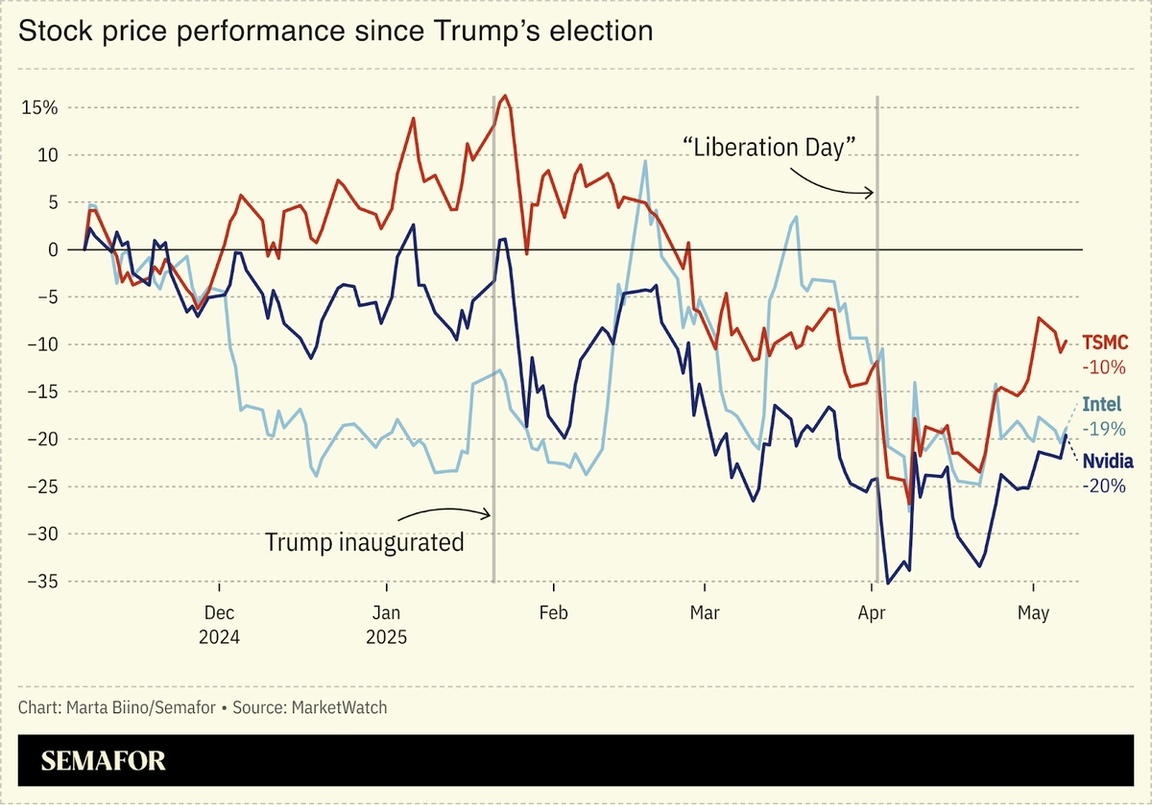 Washington indicated plans to relax Biden-era curbs on chip sales that were due to come into effect next week, but left details vague. US President Donald Trump — who is travelling to Saudi Arabia, Qatar, and the UAE next week — said officials will “soon” ease restrictions on the sale of chips to Gulf countries, casting further uncertainty on the sector as it grapples with whipsawing tariff policy. His team is also reportedly revamping the “AI diffusion rule,” which had divided the world into three tiers of nations, each with varying levels of access to cutting-edge semiconductor technology: Both Trump and Biden have sought to limit China’s access to chips, but US officials say the tiered system would have been unenforceable. |
|
Global impact of anti-DEI push |
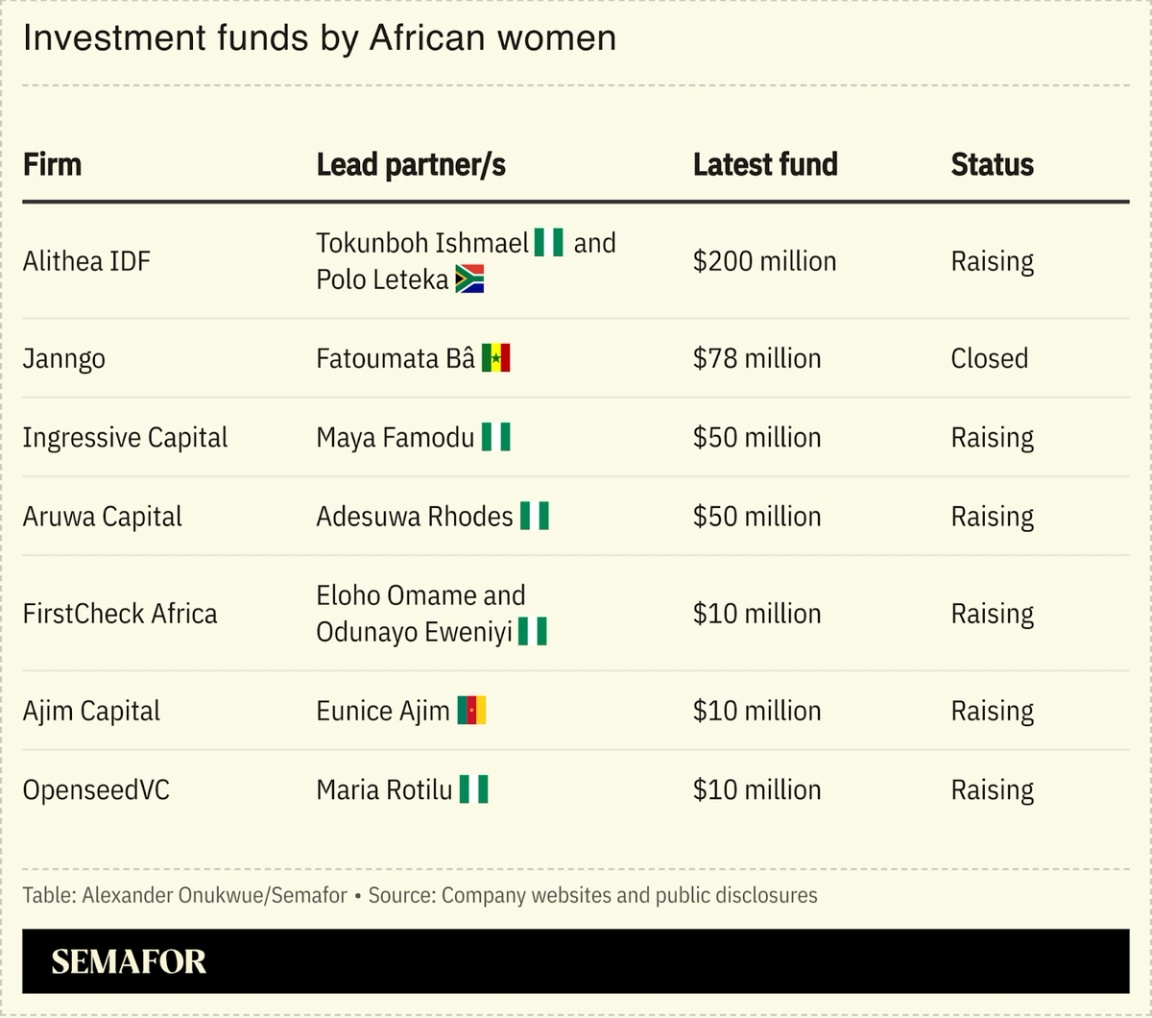 Women-led businesses in Africa are struggling to raise money because of the global fallout of US President Donald Trump’s anti-DEI push. Executives told Semafor that the campaign against diversity, equity, and inclusion had scared major investors off so-called gender-lens financing, exposing “the extent to which development finance in Africa is influenced by Washington.” Europe, too, has been affected by anti-DEI policies. In March, companies that contracted with American authorities were among those receiving letters from their US embassies requiring them to certify they do not operate DEI programs, while the American mission to Stockholm reportedly demanded a local permitting office comply with similar requirements: European officials have roundly dismissed such demands. |
|
US limits pathogen research |
 Leah Millis/Reuters Leah Millis/ReutersUS President Donald Trump moved to limit controversial research into making pathogens more dangerous. “Gain-of-function” research involves taking viruses or bacteria and modifying them to make them more transmissible or deadly, for example. The idea is to protect against future pandemics, but critics say it risks creating lethal pathogens which could then leak from a lab. Trump’s executive order imposes stiffer penalties on scientists breaking rules and a ban on federal funding for research in countries of concern, notably China. But the order’s wording is vague, making it unclear whether it required an immediate pause on all such research. “Everyone is trying to work out what exactly this means,” one researcher told Science. |
|
Papal conclave enters second day |
 Vatican Media/Handout via Reuters Vatican Media/Handout via ReutersBlack smoke emanated from the Vatican’s Sistine Chapel for a second time Thursday, signaling that no successor to Pope Francis had been elected in the latest vote. The ritual of papal selection is a closely guarded secret, and could take several days. Even the cardinals taking part often know little about it: Most of those who have rushed to Rome since Francis’ death were appointed by him and have never been involved in one before. To help understand the process, many have watched the Ralph Fiennes film Conclave, which is apparently remarkably accurate. The behind-the-scenes politicking is “no less sensational than the Hollywood imitation,” Politico reported, with Vatican insiders leaking dirt on rivals, including allegations of abuse and fraud. |
|
‘Soft power’ academic dies |
 VCG/VCG via Getty Images VCG/VCG via Getty ImagesJoseph Nye, the US political scientist who coined the term “soft power,” died aged 88. Nye served under former US President Bill Clinton as an assistant secretary of defense, but was best known for his academic work: He was “one of the most influential thinkers in contemporary international relations theory,” The Harvard Crimson noted. He helped develop the theory of neoliberalism, and aided diplomatic efforts to avoid nuclear escalation between the US and the USSR during the Cold War. His idea that a country’s non-military clout on the world stage — such as Hollywood films promoting US values, or the BBC World Service as an advert for Britain — could represent “soft power” is a crucial lens for understanding the modern world, not least for Flagship. |
|
A ‘cry against monoculture’ |
 Denis kasozi/Wikimedia Commons. CC BY-SA 4.0. Denis kasozi/Wikimedia Commons. CC BY-SA 4.0. |
|
|